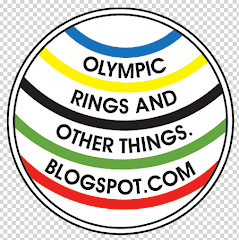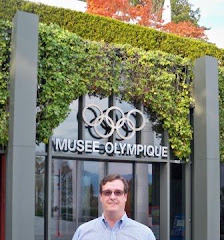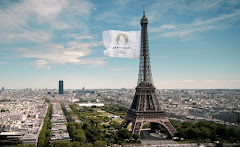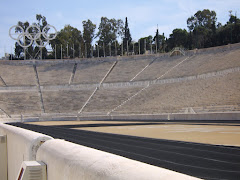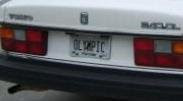The 1984 TIME Magazine Man of the Year published his five-ringed autobiography after leading the Los Angeles Olympic Organizing Committee to record-setting profitability.
Several other OOC CEO's also wrote tell-all books.
Mitt Romney shared his "Turnaround" story after leading the 2002 Salt Lake committee in the wake of an Olympic bribery scandal.
In "My Greek Drama" the Athens 2004 CEO Gianna Agelopoulos-Daskalaki shared how she led a successful bid team to bring the Games home to Greece, then how she saved the nation from humiliation when the IOC threatened their cancellation due to lack of preparation.
And north of the border, John Furlong wrote "Patriot Hearts" about the many 2010 Vancouver Olympic challenges and feats.
Noticeably missing from the roundup, however, remains a behind-the-scenes account for what was billed as "the world's largest peace-time gathering ever."
I'm writing, of course, about the 1996 Centennial Olympic Games and its leader, William Porter "Billy" Payne.
Later in this post, there's an update on Payne's answer to this question. I asked him about it at the Sept. 18, 2015, celebration he hosted in honor of the friends who rallied with Payne to bid for and win the Games 25 years ago.
But before touching on Payne's autobiography update, some additional background to set up the questions posed and answers provided a few nights ago.
In the months after Atlanta's Games ended, there was speculation about a planned Olympic book by Payne. There was also discussion as to how to summarize the Centennial Games which were a vast success but not without some avoidable snafus.
How could Payne (or anyone) write about the Atlanta Committee for the Olympic Games (ACOG) without acknowledging real or perceived glitches of that memorable summer (in no particular order, the "Situations Normal All Flamed Up" included a terrorist attack, power failures big and small, media bus delays and the off-venue transformation of downtown Atlanta into a citywide version of the city's popular Scott's Flea Market).
By the time the Sydney Olympiad rolled around, it was clear Payne decided not to write his story of Olympic glory with all its trials and tribulations, or at least to delay such a project. That was a big disappointment to some fans, volunteers, historians and, I would argue, Olympic movers and shakers eager to learn from ACOG's many successes or lessons.
As a member of Payne's ACOG staff in 1996, and later as an entry level public relations executive in 1997 to 2000, my P.R.-skewed perspective at the time was that Payne never embraced media relations in his leadership role, and media scrutiny became Payne's biggest Achilles' heel, a mistake common among CEOs and lawyers (Payne wore both of these career hats).
I also theorized that a year or two after the '96 Closing Ceremonies, still smarting from a few things beyond his control/scope of work but for which media remained critical of ACOG top brass, Payne delayed or scrapped a book out of concern or fear his version of events might not stand up to media scrutiny; it occurred to me that, like Richard Nixon at his famous "last press conference" Payne would have just assumed tell the media, "You won't have Billy to kick around anymore."
Once Payne donned the staff jacket for Augusta National Golf Club, no more would he look back or give media another "in" to ask tough questions about Atlanta missing "best ever Games" status from IOC President Juan Antonio Samaranch, a popular story line in media after Atlanta's Olympics.
One person who DID write an insider's version of Atlanta Olympic events was C. Richard Yarbrough, who served as managing director of communications for ACOG. I first met Yarbrough in winter 1996 on a referral from John Graham, then CEO of Fleishman-Hillard in St. Louis (on my last day at F-H, Graham told me, a fall 1995 intern, to "Go see my good friend Dick when you get to Atlanta" and I did, and Yarbrough was among those first met after settling in at ACOG's offices in the INFORUM).
In 2000, Yarbrough published "And They Call Them Games -- An Inside View of the 1996 Olympics" which became the main authoritative narrative of Atlanta's Games. I've always appreciated that Yarbrough invited my two cents on the book's content, and his inclusion of my name in the acknowledgements took my breath away (he also was key to landing my first P.R. job in town, so thanks are in order on that front, too).
Though Yarbrough's book accurately delves into many of ACOG's inner workings and is a great read, over time a hunger remained for Payne's tell-all tale.
As "blogger Nick" attending the Payne's "Dreamers & Believers" party a few nights ago, I asked Payne for the status of a book -- any book (???) -- and the extent to which he may have had a change of heart to write it.
"I never said I didn't want to do it," said Payne. "In fact, I've actually written 85 percent of it, and I did that within the first couple of years [after 1996]. But I got tired of doing it."
Payne explained that before and during the Games he had a personal archivist who shadowed most of his daily work for the specific purpose of capturing an authentic play-by-play of the Olympic organization. This shadow person also carried a recording device and wrote copious notes, according to Payne, and the extensive collection of materials is challenging to manage.
"It got to be too much work," said Payne.
 At this moment in our conversation, Ambassador Andrew Young, who was seated nearby, chimed in to explain that he now has some type of video recording device in his home or office that permits him to just sit down, push a button and start talking for posterity.
At this moment in our conversation, Ambassador Andrew Young, who was seated nearby, chimed in to explain that he now has some type of video recording device in his home or office that permits him to just sit down, push a button and start talking for posterity.Young suggested Payne should get one of these devices to record his memoirs during Payne's "healing time" in a few years.
"You mean my old age," said Payne, laughing with Young.
Payne picked up where he left off stating his plans for an Olympic book and biography.
"I'm going to finish it," said Payne.
When this writer asked Payne to expand on the possible timing of the book release -- suggesting 2020 might be a good option, before ACOG's 25th anniversary in 2021 -- Payne responded with his perspective.
"I haven't connected [finishing] it to a calendar because it wouldn't be a for-profit kind of thing," said Payne. "It's not a business thing for me. It's just something you write, you write it to leave it to your grandchildren."
Then Payne said something that took me back to my late 1990's speculation.
With a gleam in his eye while perhaps studying my reaction, Payne added, "You write it to maybe clarify the record."
We both chuckled.
At this time I thanked Payne for answering my questions as he motioned to an old friend a welcome to the party site. Sadly, no time this time for another book question.
My follow up for another day -- and message of encouragement from the International Society of Olympic Historians member corner of my brain -- will be to ask or suggest that Payne bury the hatchet with reporters and hire one of the best sports biographers in the world, Laura Hillenbrand of "Unbroken" and "Seabiscuit" fame, to dive into the Payne Olympic archive and get that book across the finish line.
 It may take more than the "one month" Payne predicted, but, oh, what a book that could be! Imagine the Olympic bid story followed by the ACOG organizational story. Dare to dream of a great book on the horizon.
It may take more than the "one month" Payne predicted, but, oh, what a book that could be! Imagine the Olympic bid story followed by the ACOG organizational story. Dare to dream of a great book on the horizon.
With these Atlanta Olympic CEO book wishes in mind, I took the liberty of creating some suggestions as working titles.
With thanks to Getty Images/Heinz Kluetmeier (photographer for the background image I borrowed, previously used for Sport Illustrated's pre-Games cover story about Payne), those title ideas are presented to the left and below this post's footnote.
Here's hoping Payne will resume his writing project soon!
Images via Amazon.com and Getty Images





















